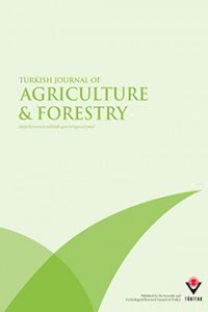Determining the Effects of Vibration Parameters and Packaging Method on Mechanical Damage in Golden Delicious Apples
This research was conducted to evaluate the effects of vibration frequency, vibration acceleration, packaging method, and vibration duration on the mechanical damage during apple transportation. The research was performed in 3 stages. Firstly, vibration frequency and vibration acceleration were measured on the truck-bed for determining the vibration frequency and acceleration distribution. Secondly, packaging transmissibility and vibration frequency sensitivity for all the packaging methods used in this research were measured. Thirdly, a laboratory vibrator, which simulates the road transportation under laboratory conditions, was used to obtain some factors influencing the mechanical damage during apple transportation. According to the results measured on the truck-bed, vibration frequency values were 8.19 Hz and 12.59 Hz for 5-10 Hz and 10-15 Hz frequency intervals, respectively. Furthermore, vibration acceleration values were 0.33 g and 0.63 g for 0.25-0.50 g and 0.50-0.75 g intervals, respectively. The highest packaging transmissibility was obtained for the volume packaging method, and packaging transmissibility was at similar high levels at the vibration frequency interval of 8-9 Hz for all packaging methods. Vibration frequency, vibration acceleration, packaging method, and vibration duration, which were taken into consideration as controlled variable parameters, significantly affected the equivalent severe bruise index at the 1% level of significance. Apples in the pattern packaging method had by far the lowest bruising, and the most suitable method for transit was pattern packaging.
Determining the Effects of Vibration Parameters and Packaging Method on Mechanical Damage in Golden Delicious Apples
This research was conducted to evaluate the effects of vibration frequency, vibration acceleration, packaging method, and vibration duration on the mechanical damage during apple transportation. The research was performed in 3 stages. Firstly, vibration frequency and vibration acceleration were measured on the truck-bed for determining the vibration frequency and acceleration distribution. Secondly, packaging transmissibility and vibration frequency sensitivity for all the packaging methods used in this research were measured. Thirdly, a laboratory vibrator, which simulates the road transportation under laboratory conditions, was used to obtain some factors influencing the mechanical damage during apple transportation. According to the results measured on the truck-bed, vibration frequency values were 8.19 Hz and 12.59 Hz for 5-10 Hz and 10-15 Hz frequency intervals, respectively. Furthermore, vibration acceleration values were 0.33 g and 0.63 g for 0.25-0.50 g and 0.50-0.75 g intervals, respectively. The highest packaging transmissibility was obtained for the volume packaging method, and packaging transmissibility was at similar high levels at the vibration frequency interval of 8-9 Hz for all packaging methods. Vibration frequency, vibration acceleration, packaging method, and vibration duration, which were taken into consideration as controlled variable parameters, significantly affected the equivalent severe bruise index at the 1% level of significance. Apples in the pattern packaging method had by far the lowest bruising, and the most suitable method for transit was pattern packaging.
